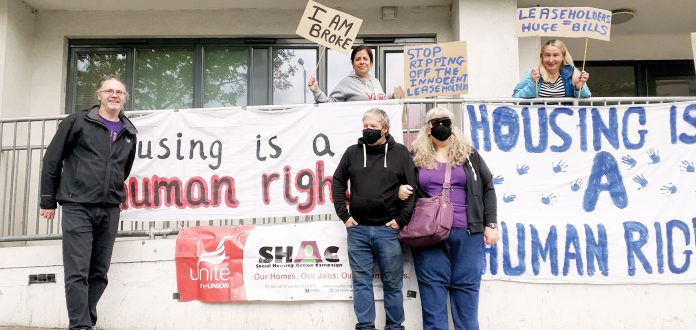
Paul Kershaw, Chair of Unite housing workers’ branch, LE1111
The Queen’s Speech contained measures designed to get headlines suggesting the government would act to support tenants. It is a response to growing pressure from tenant campaigners, but the proposals read out by Prince Charles amid pomp and glitz will not reverse the growth of unaffordable and substandard housing, or the rising numbers facing homelessness. No new money has been allocated, and ‘levelling up’ secretary Michael Gove has admitted in interviews that the previous target of 300,000 new homes per year will not be achieved.
The government has been promising to abolish ‘no fault’ evictions for private renters since April 2019. Now abolition of the hated ‘section 21’ has appeared in the government legislative programme. The step has been welcomed by campaign groups such as Generation Rent. But it won’t make much difference for those on insecure fixed-term tenancies, or those on monthly rolling contracts.
No-fault evictions
Landlord organisations have reacted angrily, even though the speech also has a commitment to strengthen landlords’ rights to gain possession. One buy-to-let landlord told the Telegraph that she was so concerned about the abolition of section 21 that she felt she had to evict a long-term tenant of six years, who had never missed a rent payment. After refurbishing the house, she raised the rent by £130 a month, while the ex-tenant was forced into sofa-surfing. Apparently it is wrong to upset landlords who kindly pocket rocketing rents for supplying insecure housing – and tenants will be punished as a result!
Private rents have risen at record rates over the past year, and by 2024 the number of homeless people is projected to rise by a third. This brutal aspect of the cost-of-living crisis is not addressed by the government despite massive public support for rent control.
Landlords will seek to further water down these already inadequate proposals in the Queen’s Speech. Tenant campaigns and trade unions need to press for more. We need a ban on economic evictions during the crisis – no evictions for arrears – and a return to ‘secure tenancies’, which were abolished by Margaret Thatcher.
The official background paper published with the Queen’s Speech points out that around one million homes in the private rented sector fail to meet the ‘Decent Homes Standard.’ Proposals to set up an ‘Ombudsman’ to hold landlords to account may sound welcome to tenants, but they lack detail and fall well short of the task.
TV and social media exposures, the Social Housing Action Campaign (SHAC) and others, have highlighted cases of squalid conditions in social housing. The official background paper also points out that 12% of social rented homes fail to meet the Decent Homes Standard, meaning over a million people are living in bad conditions.
Landlord regulation
The speech announced a plan to reintroduce so called ‘consumer regulation’ of social landlords. The ‘ConDem’ government which came to office in 2010 had declared the previous regulator as ‘toast’. It went on to cut grants for social landlords and promoted social housing as investment opportunities for global financial institutions. Landlords were further deregulated and support for tenants’ associations was largely ended. Great for the financial institutions, terrible for residents.
New performance measures for social landlords are promised, but to have any value these need to be under the control of residents. Clarion housing, a social housing provider which has repeatedly featured in exposures of terrible conditions due to disrepair, has recently boasted of high satisfaction ratings for its repairs. The landlords can’t be left to evaluate their own performance, and the government can’t be trusted to either!
Regulation is not enough to control modern giant financialised landlords. While the big landlords retain ownership of huge swathes of housing, their concern, and the concern of the financial institutions they are in hock to, will be to make money at the expense of tenants. That’s why we fight not just for genuine democratic tenants’ and worker scrutiny of rent and housing conditions, but for democratic public ownership of the big landlords, house builders and banks.


